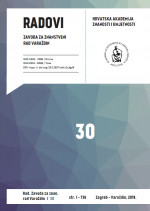ODNOS RODITELJSTVA S INDIKATORIMA DOBROBITI
THE RELATIONSHIP OF PARENTING TO INDICATORS OF WELL-BEING
Author(s): Lana Lučić, Andreja Brajša-Žganec, Ljiljana Kaliterna Lipovčan, Tihana Brkljačić, Ines SučićSubject(s): Family and social welfare, Demography and human biology, Socio-Economic Research
Published by: Hrvatska akademija znanosti i umjetnosti - Zavod za znanstveni rad Varaždin
Keywords: parenthood; well-being; life satisfaction; happiness; PWI;
Summary/Abstract: This study aimed to compare well-being of parents and childless individuals. Available literature shows inconsistency in results, indicating a need to further investigate possible differences between people who do or do not have children. This research aimed to explore these differences, by using various indicators of well-being, considering age and sex of participants. Finally, we were interested to explore the amount of variance of life satisfaction, can be explained by socio-demographic characteristics and satisfaction with specific life domains, and are there differences between participants who do or do not have children. For the purpose of this study, we used online gathered data from the second wave of Croatian longitudinal study on well-being. The sample of participants who had children (N= 1294) was older, more often in relationship or marriage and employed but with lower income per family member when compared to sample of childless participants (N=1458). In both samples, majority were women and participants did not differ regarding education level. Results showed that participants with children were more satisfied with life, happier and had flourished more, but experienced less negative affect compared to their counterparts. Gender and age showed significant interaction effect with parenthood on satisfaction with specific life domains. Post hoc analyses revealed younger parents as least satisfied with free time, but more satisfied with community connectedness compared to older parents, while lowest satisfaction with community connectedness was in the group of older childless participants. Men without children were least satisfied with love life compared to all other groups, and less satisfied with community connectedness compared to women. Fathers were more satisfied with physical appearance compared to all other groups, while women without children were more satisfied with friends compared to men.
Journal: Radovi Zavoda za znanstveni rad Varaždin
- Issue Year: 2019
- Issue No: 30
- Page Range: 377-404
- Page Count: 28
- Language: Croatian

